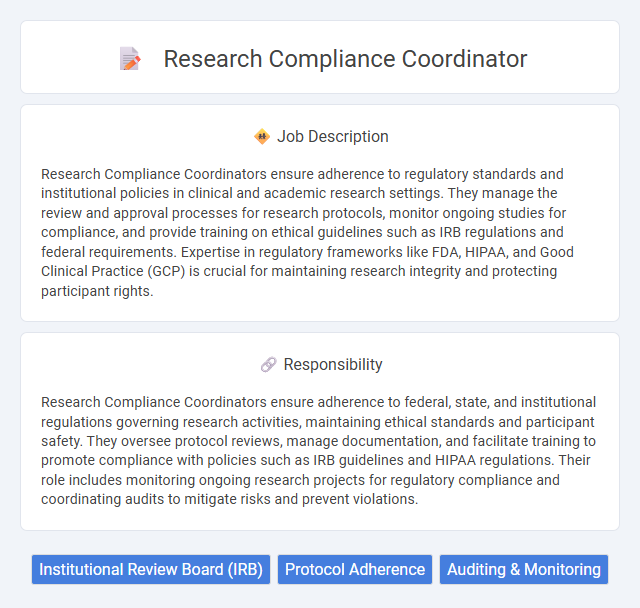
Research Compliance Coordinators ensure adherence to regulatory standards and institutional policies in clinical and academic research settings. They manage the review and approval processes for research protocols, monitor ongoing studies for compliance, and provide training on ethical guidelines such as IRB regulations and federal requirements. Expertise in regulatory frameworks like FDA, HIPAA, and Good Clinical Practice (GCP) is crucial for maintaining research integrity and protecting participant rights.
Individuals with strong attention to detail and a passion for upholding ethical standards are likely to be well-suited for a Research Compliance Coordinator role. Those who are comfortable navigating complex regulatory environments and possess excellent communication skills may find this position aligned with their strengths. However, people who struggle with meticulous documentation or prefer less structured tasks might face challenges in meeting the demands of this job.
Qualification
A Research Compliance Coordinator typically requires a bachelor's degree in life sciences, public health, or a related field, with preferred certifications such as Certified IRB Professional (CIP) or Certified Research Compliance Professional (CRCP). Strong knowledge of federal regulations including FDA, HIPAA, and OHRP guidelines is essential to ensure adherence to ethical and legal standards in research activities. Effective organizational skills and experience with institutional review boards (IRB) protocols enhance the ability to manage compliance documentation and training programs efficiently.
Responsibility
Research Compliance Coordinators ensure adherence to federal, state, and institutional regulations governing research activities, maintaining ethical standards and participant safety. They oversee protocol reviews, manage documentation, and facilitate training to promote compliance with policies such as IRB guidelines and HIPAA regulations. Their role includes monitoring ongoing research projects for regulatory compliance and coordinating audits to mitigate risks and prevent violations.
Benefit
Research Compliance Coordinator roles likely offer significant benefits such as enhanced understanding of regulatory frameworks and the opportunity to ensure ethical standards in research projects. Professionals in this position probably gain experience in navigating complex compliance requirements, which can improve career advancement prospects. The role may also provide a chance to contribute to the integrity and quality of scientific work, attracting organizations that value responsible research practices.
Challenge
The Research Compliance Coordinator role likely involves navigating complex regulatory environments, requiring strong attention to detail and up-to-date knowledge of compliance standards. Challenges may arise in balancing timely research progress with strict adherence to ethical guidelines and institutional policies. Managing communication between researchers, committees, and regulatory bodies could also present ongoing difficulties in ensuring consistent compliance.
Career Advancement
Research Compliance Coordinators play a critical role in ensuring adherence to regulatory standards and institutional policies during research activities, which builds a strong foundation for career advancement in the fields of research administration and compliance. Mastery of federal regulations such as FDA, HIPAA, and OHRP, combined with experience in audit preparation and risk management, significantly enhance opportunities for promotion to senior compliance or research administration roles. Professionals in this role often leverage certifications like Certified Research Administrator (CRA) or Certified Compliance and Ethics Professional (CCEP) to advance into leadership positions overseeing institutional review boards or compliance departments.
Key Terms
Institutional Review Board (IRB)
Research Compliance Coordinators play a critical role in managing and overseeing Institutional Review Board (IRB) processes to ensure ethical standards and regulatory compliance in human subjects research. Their responsibilities include preparing and reviewing IRB submissions, coordinating meeting agendas, and monitoring ongoing research activities to safeguard participant rights and data integrity. Expertise in federal regulations such as the Common Rule and FDA guidelines is essential for maintaining adherence to institutional policies and federal laws.
Protocol Adherence
A Research Compliance Coordinator ensures strict protocol adherence by monitoring study procedures to align with regulatory standards and institutional policies. They review research activities regularly, identify deviations, and implement corrective actions to maintain compliance and protect participant safety. Effective oversight of protocol adherence supports ethical research conduct and reliable data integrity throughout clinical trials.
Auditing & Monitoring
Research Compliance Coordinators play a critical role in auditing and monitoring research activities to ensure adherence to institutional policies and regulatory requirements. They systematically review study protocols, consent forms, and data collection methods to identify potential compliance issues and mitigate risks. Their work supports maintaining ethical standards and protecting human subjects in research while facilitating continuous improvement in regulatory practices.
 kuljobs.com
kuljobs.com